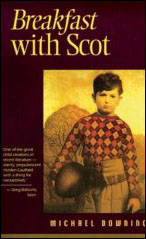
Michael Downing is the author of Breakfast With Scot, the first selection of the Seattle Gay & Lesbian Book Club, meeting every Wednesday at 6PM, at Dunshee House, and hosted by our own Nick DiMartino. The novel was made into a movie of the same name, that played here in Seattle just this past Fall. Downing is the author of three novels before Breakfast With Scot, including Mother of God and Perfect Agreement (soon to be reissued,) as well as plays and two nonfiction titles. What follows is an email Q & A based on questions that have already come up in our ongoing Book Club discussion. More to follow in Part Two.
Brad Craft: Thank you for agreeing to do this, Michael. It means a lot to be able to ask questions of the author of our first selection for the Seattle Gay & Lesbian Book Club. Now then, family seems to be the topic, or at least the setting for all your fiction to date. In Breakfast With Scot, that family consists of a young gay couple, Ed and Sam, and Scot, the 11 year old of whom they become the guardians when his mother dies. In the novel, neither Ed nor Sam seem to have much family, other than the reprobate brother of Sam who leaves Scot with them.

Michael Downing: For starters, I most wanted to write about gay men whose relationship to the past was not traumatic. In practical terms, the absence of extended families made Sam & Ed more receptive to their neighbors -- and more vulnerable too. I mean, Mildred (an older neighbor who befriends them) might have been a little less bold had she noticed a woman of her age in the mix next door.
I also wanted to keep the scale of the novel small -- the lived time is something less than four months -- to preserve the fragile, indeterminate quality of the whole enterprise and of Scot himself. One way to do this was to give both Sam and Ed relatively uncomplicated pasts. This also increased their agency, I think. It put the burden of choice -- their choices about Scot, I mean -- squarely on them in the moment. Finally, I wanted to establish their reasonableness quotients so that most readers would want to be aligned with them -- and find themselves in the peculiar position of having to make judgments and decisions that would affect Scot's sense of himself.
BC: And yet, you have given the boys an extended family of sorts, a "family of choice," consisting of friends and neighbors. Many of us have created just such families in our own lives.
MD: That phrase "family of choice" was absolutely in the air while I was writing (this book,) but the comic possibility I saw was in the inverted idea; the problem of being embraced by families we don't choose, families who choose us. That's really the basis for Ed's brief against Scot during the first half of the novel. Suddenly, Ed finds that he's part of a vast, invasive, opinionated, extended Cambridge family. (The novel is set in Cambridge, Mass., where Downing still lives.) It's as if Ed has been adopted against his will.
BC: We're curious about your own family. The bio. on your website mentions your partner of twenty years.
MD: My pal Pete and I have been together for 25 years -- my bio. needs updating, I guess. We have both always been welcomed into each other's families. Lucky us, huh?
BC: Indeed.
MD: And we've lived in Cambridge forever -- a choice I never regret.
BC: And the rest of your family?
MD: My family story is not easy to summarize -- but whose is? For starters, I am the youngest of nine kids, and my father died when I was three. I'd say more, but I'm madly writing the last bits of a memoir these days, and I have to conserve my words. My childhood figures prominently in the first half of the book, and the second half is about a genetic diagnosis that recently complicated the familiar story of my life. The book's called I'll Make It Up To You, and it will be published at the end of this year.
BC: We'll all be looking forward to reading it. To get back to Breakfast With Scot, we noticed that Scot is yet another "lost" child, an orphan or all but an orphan, and that this seems to be a recurring theme in your fiction. Any thoughts on why that might be?
MD: Here's all I know: orphans and castoffs and castaways instantly evoke my pity and my envy. That's an unusual double-header.






No comments:
Post a Comment
Thanks for your comment! We love hearing from you.